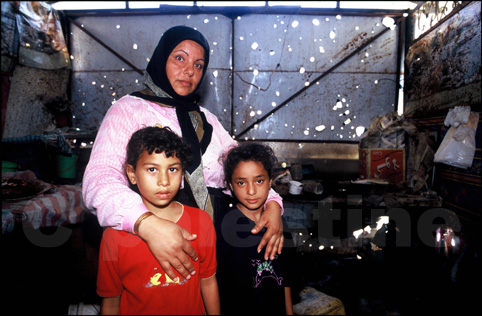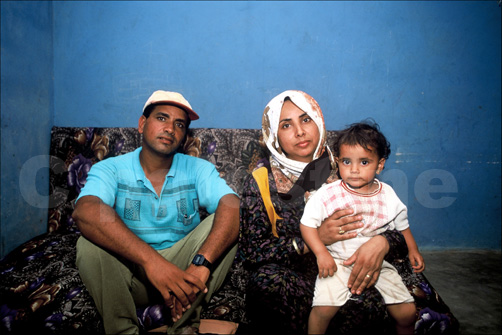
september 2004


.
Sabra and Chatila Palestinian Refugee Camps
Through
Children's Eyes: Children's Rights in Chatila Camp
'A Place without Identity, An Identity without a Place' by Mariam Azzouk and Usama Abu al Shaykh
Who are we? Where do we belong? On the refugee card we carry, the Director of Surete Generale certifies that we are Palestinians residing in Lebanon - in other words, that we are Palestinian refugees. We know nothing about Palestine, the place, except the stories we were told by our parents who never even lived there. Palestine has become a place we escape to every time we face a problem in our place of residence, Chatila, or every time we think about our tragedy as refugees. But what's the use of having a Palestinian identity if Palestine the place is not ours? This identity of ours brings us nothing but trouble. In Lebanon we're called refugees and displaced people and we don't have any rights. We are not allowed to travel to any other land on the globe. And if we do travel, we're not allowed to return to our place of residence [in Sept 1995, Palestinian refugees holding Lebanese travel docs were required by governmental decision to obtain exit and re-entry visas if they wished to travel outside the country. This ruling was revoked in Jan 1999. -ed].
But, is the place we live in, Chatila, our identity? Of course not! What can we belong to in Chatila? To the garbage? or to the alleyways that stink of sewage? Why should we belong to Chatila? In Chatila we're only allowed to take menial jobs; in Chatila there's no health care and no education; in Chatila we get sick because of the humidity and the unhygienic conditions; in Chatila we have to buy our water and electricity visits only occasionally; and in Chatila we can't find a place to play or a tree to sit under. And if we want to leave Chatila, we need an exit and reentry permit. In short, in Chatila, we're not treated like people, and we have no future.
So we don't carry the identity of the place we live in, and the identity we carry has no place. Who are we? Will we become Palestinians in the future? Or will we remain refugees stripped of all our human rights until God knows when?
We want an identity that will preserve our dignity and make us feel secure, so when will we get it? We want an identity with a place, so when will we return to Palestine?
*************
'I Want to Play, Not Work' by Muhammed Daud, with Mona Zaaroura
What can I tell you? Where do I start? I'll tell you the story of my life, which is the story of working children in Chatila. My name is Muhammed Daud and I'm fourteen years old. I'm in the second intermediate (8th grade) and I'm 145 centimeters tall, which means that I'm short for my age. I'm around the height of an eight year old, which is the age when I started working.
Since then, I haven't grown much. I work all summer long and throughout the holidays in the winter. I'm still in school, although our schools are miserable. I work because my future will be in these jobs. Even if I finish school, the fact that I'm Palestinian means that I'll be a house-painter, baker, garbage collector, electrician, or mechanic. For a long time, I worked in pickling and canning to the point where my hands were worn out by the vinegar. I've worked as a blacksmith's apprentice, in a cafe, and painting houses in Chatila.
When I work in Chatila, I don't feel miserable or curse my life, because all the children work here and child labor isn't something strange. But it was different when I worked during the summer on a building site in the town of Shmays, near Shahim [between Beirut and Sidon], and saw the way that children play and run there, while I was carrying buckets of cement and polishing sheet metal (which makes me short of breath). Then I started to ask myself why I wasn't playing and running in the fields the way those other children were. Why did I have to go from school to work? Why am I living this tiring and miserable life? Why do I have to work to live? I know why: because I come from the camp, because I'm a Palestinian refugee. That's why I'm asking to be granted my civic right, and I hope this timeless message will be seen by everyone around the world. I want to play, not work.
****************
'I'm a Child, but I was Engaged" by Rana Kassem, with Rana al Hassan and Suzanne Abd al Hadi
I'm a girl, who, like most girls in Chatila, became engaged when I was still a child. Last winter I was thirteen, and I didn't think much about the tragedies of the miserable life we lead in the camp. My main concerns were dabke dancing and playing with my friends.
One day I went on a trip with Bayt Atfal al-Sumud and I caught the eye of a man I didn't know. So he asked about me, was introduced to the household, and asked for my hand in marriage. My mother agreed to the match without asking for my opinion. Because of my father's death and our poor living conditions, my mother's opinion was all that mattered. She insisted on my getting married, and I gave in. The engagement period was one of the cruelest periods of my life. They would sometimes call me when I was playing with my friends because the man had come to visit us and I was supposed to receive him. I used to be very afraid of him and I hated him.
Because of this fear I often got sick. Every time I saw him, I'd have a fever and start crying. I imagined him as a monster who scares children. Since I was always sick, I managed to rid myself of this nightmare. So, I didn't get married at fourteen like most other girls in Chatila, some of whom think that marriage may be a way out of the prison of the camp.
Girls here have nowhere to play. Our parents are poor and cannot buy us clothes or take us on trips outside the camp. So, because of their parents' poor living conditions, girls are married off while they are still children so that their parents can stop worrying about them. Mostly, the groom is still a teenager and lives in the camp. Often, he has started working at ten or thirteen and has no future to build, so he gets engaged and married to amuse himself, since he has no other source of amusement.
I'd like to advise all parents not to consent to their daughters marrying before they are eighteen.
**********
During the
academic year 2000-2001, Betsy Crook's Middle East
History class at the American Community School, Beirut,
Lebanon undertook an oral history project that included
on-site work in the Palestinian refugee camps of Sabra
and Chatila in Beirut.
PALESTINIANS IN JORDAN
As a result of the flowing masses of Palestinians during the first and second wars in 1948 and 1967, refugee camps were created at the fringes of main cities of the Kingdom. To provide shelters for the refugees of the first wave, five camps were constructed: Zarqa (1949), Irbid (1951) , Al-Hussein (1952) , Wihdat (New Amman Camp)(1955) , Madaba (1956).
Eight other camps were constructed to provide shelters for those displaced as a result of the second wave of immigration. Those camps were Talbiyeh, Hitteen (Schneller, Marka), Al-Baqa' a, Jerash (Gaza), Souf, Azmi Al-mufti (Al-Husun), and Hay el Amir Hassan (Hinikeen). They were established in 1967, 1968, and 1969.
To mention, some refugee camps hold several names, one official and another local one related to a person or an event, the other name for each camp was provided here between parentheses.
The coercive and
unorganized nature of the two immigration waves were
reflected on a swift and random choice of camp sites;
while there was no standard pattern for camp building.
Some camps were setup in the same location where the
refugees of the displaced had first settled upon their
arrival to the Kingdom; other camps were constructed
years after the immigration when the Jordanian government
offered the land plots to UNRWA which built shelters and
handed them over to the Palestinian refugees. Jordan
government till today rent the land of some camps from
its owners. In general, the camp services of water,
electricity, communications are fully government
provided. Pathways, paved and asphalted roads are taken
care by the government of Jordan, represented by the DPA.
UNRWA, in turn, continues to be in charge of the
environmental health care in UNRWA recognized camps.

Photos by Steve
Sabella